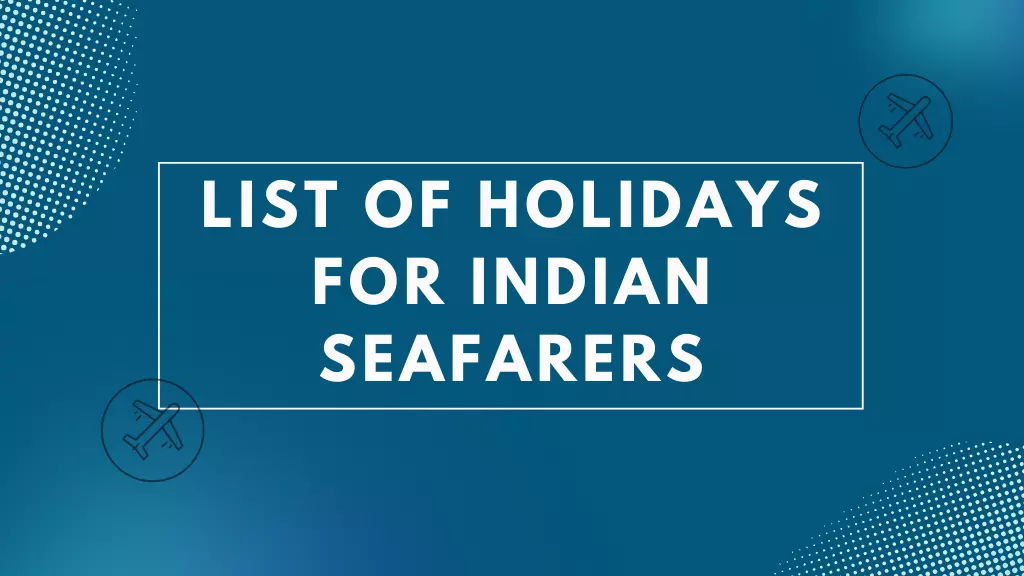The life of an Indian seafarer is often demanding and filled with long stretches away from home. Unlike regular office jobs, seafarers face unique challenges, including extended periods at sea, physical strain, and emotional stress due to separation from family. Amidst these challenges, holidays serve as crucial periods for rest, recuperation, and reconnecting with loved ones. A comprehensive list of holidays for Indian seafarers is essential for planning, ensuring that seafarers can manage their leave efficiently while maintaining compliance with maritime regulations. Understanding these holidays not only helps seafarers enjoy their time off but also allows employers and shipping companies to plan crew rotations effectively.
Holidays for Indian seafarers are determined by a combination of statutory requirements, company policies, and international maritime labor regulations. These holidays typically include national holidays, religious observances, and specific leave entitlements mandated under the Merchant Shipping Act and related agreements. This guide will provide an in-depth overview of these holidays, highlighting the significance of each, the rules governing leave, and how seafarers can utilize them optimally.
Importance of Holidays for Indian Seafarers
Holidays are more than just a break from routine for Indian seafarers. They are essential for physical recovery, mental well-being, and professional productivity. Seafarers often work in confined spaces under strict schedules, which can lead to fatigue and stress. Regularly scheduled holidays ensure that they can maintain their health and morale. Moreover, holidays provide a chance to reconnect with family and friends, which is critical for emotional balance. Without proper breaks, seafarers are at higher risk of fatigue-related accidents and reduced performance onboard.
The Indian maritime sector recognizes the importance of rest periods. Employers are mandated to comply with international labor standards, such as those set by the International Labour Organization (ILO) and the Maritime Labour Convention (MLC), which ensure seafarers receive adequate rest and holidays. These measures are not just regulatory obligations but also play a pivotal role in promoting a safer, more efficient, and more satisfied workforce.
Statutory Holidays for Indian Seafarers
Statutory holidays for Indian seafarers are typically aligned with national and regional holidays observed in India. These holidays are recognized under labor laws and maritime regulations, ensuring that seafarers are entitled to time off regardless of their shipping company policies. Common statutory holidays include Independence Day, Republic Day, Gandhi Jayanti, and other nationally recognized days.
For seafarers, statutory holidays may not always coincide with being on shore, as their work schedules at sea can be continuous. However, these holidays are often accounted for in their leave entitlements, allowing them to take compensatory leave when they return to port. Shipping companies maintain detailed rosters and holiday calendars to manage crew rotations effectively, ensuring that statutory leave obligations are met without disrupting ship operations.
National Holidays Observed by Indian Seafarers
Indian seafarers typically observe the following national holidays:
Independence Day on August 15th is celebrated to mark India’s freedom from colonial rule. Republic Day on January 26th commemorates the adoption of the Indian Constitution. Gandhi Jayanti on October 2nd honors the birth of Mahatma Gandhi. Other holidays may include regional observances or holidays specific to the home state of the seafarer. These holidays offer a chance to honor national pride and heritage, even while far from home.
Religious Holidays for Indian Seafarers
India is a country with diverse religious traditions, and holidays often reflect this cultural richness. Seafarers may observe religious holidays such as Diwali, Eid, Christmas, and Guru Nanak Jayanti. These holidays hold spiritual significance and provide an opportunity for seafarers to maintain their religious practices while at sea or during shore leave.
Religious holidays may vary in date based on lunar calendars, so shipping companies plan leave schedules accordingly. Seafarers are encouraged to communicate their religious leave preferences to their employers to ensure that these holidays can be accommodated without affecting ship operations. This balance between personal observances and professional obligations is crucial for maintaining harmony onboard.
Significance of Religious Holidays
Religious holidays serve as a reminder of cultural identity and personal values for Indian seafarers. Observing these holidays, even in limited capacity at sea, allows seafarers to stay connected to their traditions. This connection fosters emotional well-being and provides comfort during long voyages. Companies often provide opportunities for seafarers to celebrate these holidays collectively onboard, fostering a sense of community and support among the crew.
Annual Leave Entitlements for Indian Seafarers
In addition to national and religious holidays, Indian seafarers are entitled to annual leave, which is an important component of the list of holidays for Indian seafarers. Annual leave is typically calculated based on the duration of service and time spent onboard. According to the Merchant Shipping Act, seafarers accrue leave that can be taken during shore leave or scheduled periods of rest.
Annual leave allows seafarers to plan personal time for family, travel, or rest. The flexibility in leave scheduling ensures that seafarers can take breaks without disrupting the operational requirements of their vessels. Proper management of annual leave is essential for maintaining both compliance with maritime regulations and overall job satisfaction.
Rules Governing Annual Leave
The rules for annual leave are clearly outlined under Indian maritime labor laws. Seafarers earn a certain number of days of leave for each month or year of service, depending on their contract type. Leave can be taken in full or partially, with the employer’s approval. Compensatory leave arrangements are also common if seafarers are unable to take their leave due to extended voyages. These regulations ensure that all seafarers have fair access to rest periods and are not overburdened by continuous service at sea.
Compensatory Holidays for Seafarers at Sea
Given the nature of maritime work, seafarers often spend holidays away from home while onboard. To address this, compensatory holidays are granted to ensure seafarers do not miss out on essential rest periods. Compensatory holidays allow seafarers to take their entitled holidays at a later date when they are on shore. This practice is crucial for maintaining morale and compliance with labor laws.
Shipping companies maintain records of statutory and religious holidays to calculate compensatory leave accurately. These arrangements demonstrate the commitment of maritime organizations to the welfare of seafarers, ensuring they receive the benefits they are entitled to despite the challenging work environment.
How Compensatory Leave Works
Compensatory leave is typically scheduled based on mutual agreement between the seafarer and the employer. It can be combined with annual leave or taken independently. Seafarers are advised to plan their compensatory leave well in advance to align with shipping schedules and personal commitments. Proper planning helps ensure that seafarers can enjoy their holidays without impacting ship operations or contractual obligations.
International Maritime Labor Regulations Impacting Holidays
The International Labour Organization (ILO) and the Maritime Labour Convention (MLC) provide a framework for seafarers’ rights, including holiday entitlements. Indian seafarers benefit from these international regulations, which ensure fair treatment, rest periods, and leave entitlements. Compliance with these standards is mandatory for shipping companies operating under Indian law, offering seafarers additional security regarding their rights and benefits.
These regulations also promote safety onboard. Well-rested seafarers are less likely to experience fatigue-related accidents, making adherence to holiday schedules critical for operational efficiency. International standards complement national regulations, creating a comprehensive system that protects the welfare of seafarers at sea.
Planning Holidays for Indian Seafarers
Effective planning of holidays is essential for maximizing rest and ensuring compliance with labor laws. Seafarers are encouraged to maintain open communication with their employers regarding preferred leave dates, especially for national and religious holidays. Employers, in turn, must coordinate leave schedules to avoid conflicts and ensure adequate staffing onboard. Advanced planning also allows seafarers to synchronize their holidays with family commitments, enhancing their overall work-life balance.
Shipping companies often use digital leave management systems to track holidays, annual leave, and compensatory leave. This ensures transparency, reduces administrative errors, and allows seafarers to plan personal time effectively. A well-structured holiday plan contributes to higher job satisfaction and improved crew morale.
Best Practices for Holiday Planning
Seafarers should document their leave requests and maintain a personal calendar of holidays. Flexibility is key, as shipping schedules can change due to operational needs or unforeseen circumstances. By planning in advance and staying informed about statutory and religious holidays, seafarers can ensure that they utilize their entitled time off effectively, contributing to better mental and physical health.
Challenges in Observing Holidays at Sea
Despite the importance of holidays, observing them while at sea can be challenging. Long voyages, unpredictable weather, and operational demands often interfere with holiday schedules. Additionally, being away from family and cultural celebrations can affect emotional well-being. Seafarers must adapt to celebrating holidays in alternative ways, such as onboard gatherings, virtual interactions with family, or observing personal rituals.
Shipping companies play a critical role in mitigating these challenges by providing onboard facilities, organizing small celebrations, and ensuring compensatory leave when seafarers return to port. A supportive work environment helps seafarers maintain morale and reduces the stress associated with extended periods at sea.
Emotional and Social Impact
The inability to observe holidays traditionally can impact seafarers’ emotional health. Feelings of isolation or missing significant life events are common. Maintaining social connections through technology, celebrating onboard with peers, and planning future leave can help seafarers cope with these challenges. Recognizing the emotional significance of holidays is essential for both seafarers and employers in promoting a healthy work environment.
Conclusion
In conclusion, a well-defined list of holidays for Indian seafarers is vital for their physical, emotional, and professional well-being. National and religious holidays, annual leave, and compensatory leave form the core components of a seafarer’s holiday entitlement. Proper planning, adherence to statutory and international regulations, and a supportive work environment ensure that seafarers can enjoy their holidays effectively, even while managing the unique demands of maritime work.
For Indian seafarers, holidays are more than just days off they are an essential aspect of a balanced and fulfilling professional life. By understanding holiday entitlements and planning accordingly, seafarers can maintain their health, morale, and efficiency, contributing to safer and more productive shipping operations.
FAQs
How many holidays do Indian seafarers get in a year?
The number of holidays varies based on service duration, employment contract, and company policies. Seafarers receive statutory, religious, and annual leave, with compensatory holidays provided if they are at sea during official holidays.
Can Indian seafarers celebrate holidays while onboard?
Yes, seafarers can observe holidays onboard through small gatherings, virtual celebrations with family, or personal rituals. Companies often facilitate onboard celebrations to boost morale.
What is compensatory leave, and how does it work?
Compensatory leave is granted when seafarers miss statutory or religious holidays while at sea. It can be scheduled during shore leave or combined with annual leave, ensuring they receive entitled rest periods.
Are Indian seafarers entitled to leave under international regulations?
Yes, international conventions like the Maritime Labour Convention (MLC) and ILO standards ensure that seafarers receive fair holiday entitlements, complementing national laws.
How should seafarers plan their holidays effectively?
Seafarers should communicate leave preferences with employers, maintain personal calendars, and stay flexible to adapt to shipping schedules. Advanced planning ensures maximum utilization of entitled holidays.





